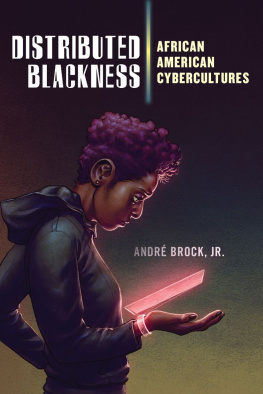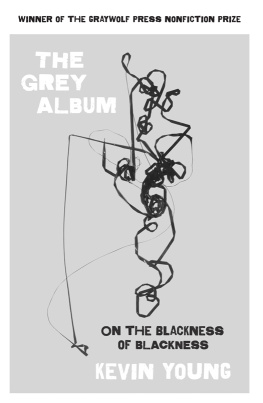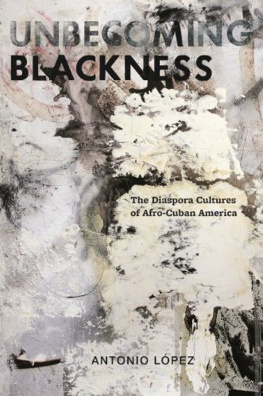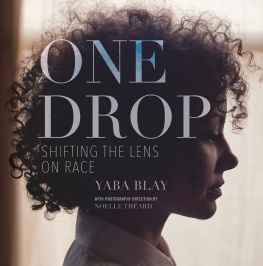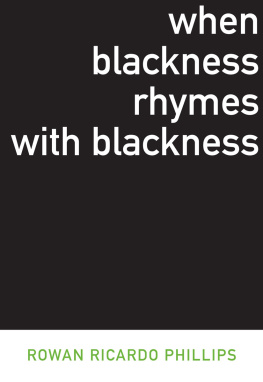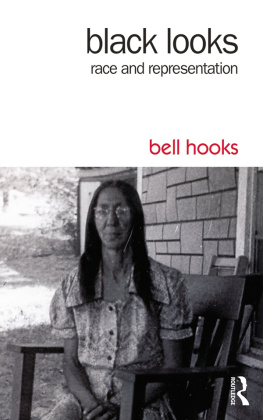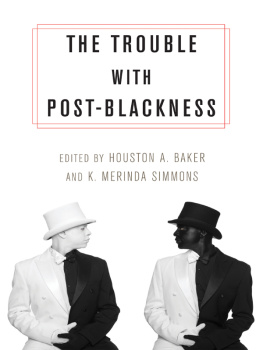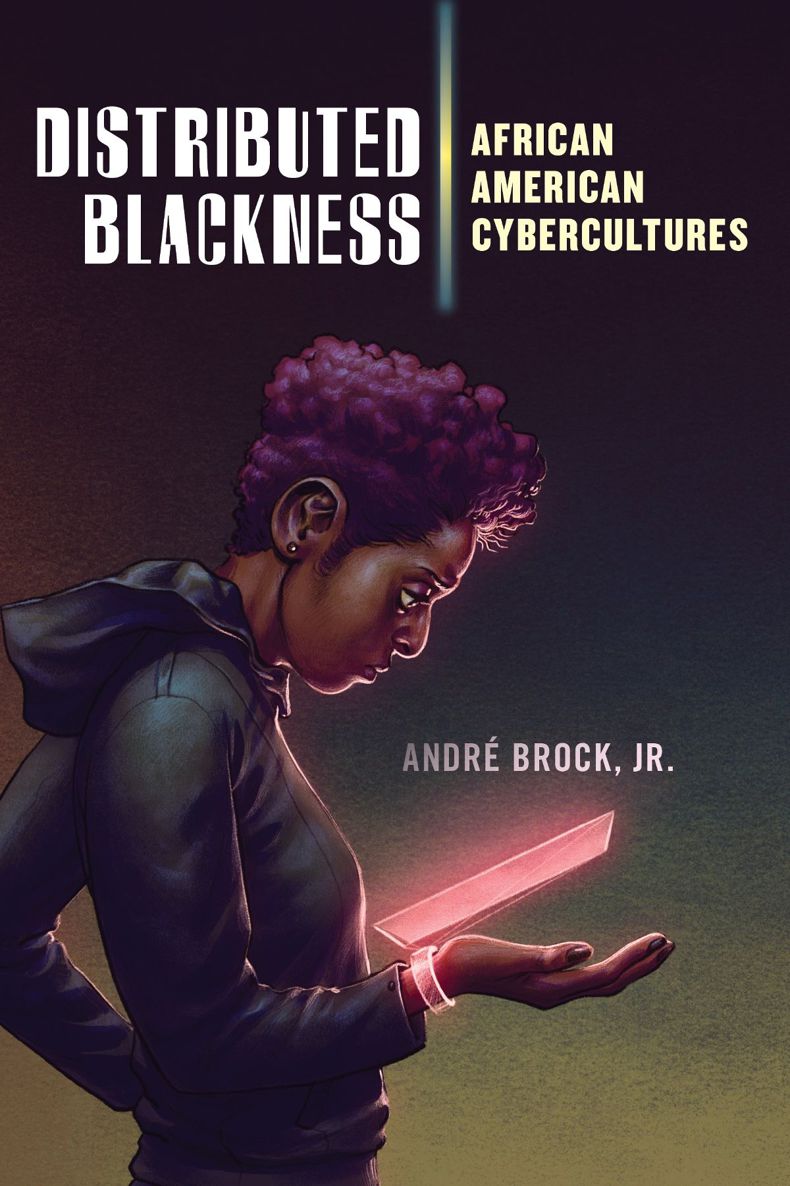
DISTRIBUTED BLACKNESS
CRITICAL CULTURAL COMMUNICATION
General Editors: Jonathan Gray, Aswin Punathambekar, Adrienne Shaw
Founding Editors: Sarah Banet-Weiser and Kent A. Ono
Dangerous Curves: Latina Bodies in the Media
Isabel Molina-Guzmn
The Net Effect: Romanticism, Capitalism, and the Internet
Thomas Streeter
Our Biometric Future: Facial Recognition Technology and the Culture of Surveillance
Kelly A. Gates
Critical Rhetorics of Race
Edited by Michael G. Lacy and Kent A. Ono
Circuits of Visibility: Gender and Transnational Media Cultures
Edited by Radha S. Hegde
Commodity Activism: Cultural Resistance in Neoliberal Times
Edited by Roopali Mukherjee and Sarah Banet-Weiser
Arabs and Muslims in the Media: Race and Representation after 9/11
Evelyn Alsultany
Visualizing Atrocity: Arendt, Evil, and the Optics of Thoughtlessness
Valerie Hartouni
The Makeover: Reality Television and Reflexive Audiences
Katherine Sender
Authentic: The Politics of Ambivalence in a Brand Culture
Sarah Banet-Weiser
Technomobility in China: Young Migrant Women and Mobile Phones
Cara Wallis
Love and Money: Queers, Class, and Cultural Production
Lisa Henderson
Cached: Decoding the Internet in Global Popular Culture
Stephanie Ricker Schulte
Black Television Travels: African American Media around the Globe
Timothy Havens
Citizenship Excess: Latino/as, Media, and the Nation
Hector Amaya
Feeling Mediated: A History of Media Technology and Emotion in America
Brenton J. Malin
The Post-Racial Mystique: Media and Race in the Twenty-First Century
Catherine R. Squires
Making Media Work: Cultures of Management in the Entertainment Industries
Edited by Derek Johnson, Derek Kompare, and Avi Santo
Sounds of Belonging: U.S. Spanish-Language Radio and Public Advocacy
Dolores Ins Casillas
Orienting Hollywood: A Century of Film Culture between Los Angeles and Bombay
Nitin Govil
Asian American Media Activism: Fighting for Cultural Citizenship
Lori Kido Lopez
Struggling For Ordinary: Media and Transgender Belonging in Everyday Life
Andre Cavalcante
Wife, Inc.: The Business of Marriage in the Twenty-First Century
Suzanne Leonard
Homegrown: Identity and Difference in the American War on Terror
Piotr Szpunar
Dot-Com Design: The Rise of a Useable, Social, Commercial Web
Megan Sapnar Ankerson
Postracial Resistance: Black Women, Media, and the Uses of Strategic Ambiguity
Ralina L. Joseph
Netflix Nations: The Geography of Digital Distribution
Ramon Lobato
The Identity Trade: Selling Privacy and Reputation Online
Nora A. Draper
Media & Celebrity: An Introduction to Fame
Susan J. Douglas and Andrea McDonnell
Fake Geek Girls: Fandom, Gender, and the Convergence Culture Industry
Suzanne Scott
Locked Out: Regional Restrictions in Digital Entertainment Culture
Evan Elkins
The Digital City: Media and the Social Production of Place
Germaine R. Halegoua
Distributed Blackness: African American Cybercultures
Andr Brock Jr.
Distributed Blackness
African American Cybercultures
Andr Brock Jr.

NEW YORK UNIVERSITY PRESS
New York
NEW YORK UNIVERSITY PRESS
New York
www.nyupress.org
2020 by New York University
This work is licensed under the Creative Commons Attribution-NonCommercial-NoDerivatives 4.0 license (CC BY-NC-ND 4.0). To view a copy of the license, visit https://creativecommons.org/licenses/by-nc-nd/4.0.
References to internet websites (URLs) were accurate at the time of writing. Neither the author nor New York University Press is responsible for URLs that may have expired or changed since the manuscript was prepared.
Library of Congress Cataloging-in-Publication Data
Names: Brock, Andr L., Jr., author.
Title: Distributed blackness : African American cybercultures / Andr Brock, Jr.
Description: New York : New York University Press, [2019] | Series: Critical cultural communication | Includes bibliographical references and index.
Identifiers: LCCN 2019012037 | ISBN 9781479820375 (cloth ; alk. paper) | ISBN 9781479829965 (paperback ; alk. paper)
Subjects: LCSH: African AmericansCommunication. | African Americans and mass media. | African AmericansIntellectual life21st century. | InternetSocial aspectsUnited States. | Online social networksUnited States.
Classification: LCC P94.5.A37 .B76 2019 | DDC 302.23089/96073dc23
LC record available at https://lccn.loc.gov/2019012037
To my grandmother, Mrs. Florence Elaine Paris Scott Brock, House Hollis, First of Her Name
I finally finished it, Grandma
CONTENTS
Race can be ontological without being biological, metaphysical without being physical, existential without being essential, shaping ones being without being ones shape.
Charles Mills (1998, p. xiv)
The Black body has long been a featureand shibbolethof articulations and theorizations of Black culture. But online identity has long been conflated with whiteness, even as whiteness is itself signified as a universal, raceless, technocultural identity. By this I mean that whiteness is what technology does to the Other, not the technology users themselves. The visibility of online Blackness can be partially attributed to the concentration of Black folk in online spaces that are not exclusively our own; we are finally present online in ways that the mainstream is unable to disavow. Imagine, if you will, millions of Black people interacting through networked deviceslaptops, computers, smartphonesat once separate and conjoined. This online aggregation and coherence of Blackness online, absent Black bodies, is what inspired this book.
I titled this book Distributed Blackness to evoke how Blackness has expertly utilized the internetworks capacity for discourse to build out a social, cultural, racial identity. Black online culture and sociality are more easily visualized today thanks not only to the hashtag and other algorithmic means but also to the near infrastructural use of social networking services as well as older online artifacts, such as messaging services, blogs, and bulletin boards, where one could see articulations of Black identity across digital networks. My subtitle, African American Cybercultures, speaks to this texts theoretical and rhetorical thinking about how and why Blackness and Black culture are easily and pungently performed, absent embodiment, when mediated by technologiesspecifically information technologies, the online, and the digital.
Distributed Blackness is also a reference to the methodology used throughout this text: critical technocultural discourse analysis (CTDA). I devised CTDA as a corrective to normative and analytic research on cultural digital practice. It decenters the Western deficit perspective on minority technology use to instead prioritize the epistemological standpoint of underrepresented groups of technology users. CTDA pulls together multiple disparate data points to conduct a holistic analysis of an information technology artifact and its practices.
Next page
